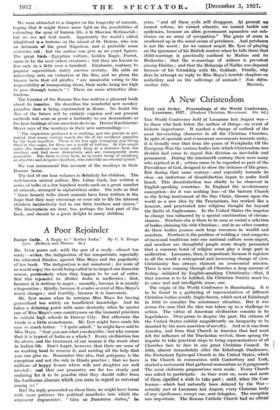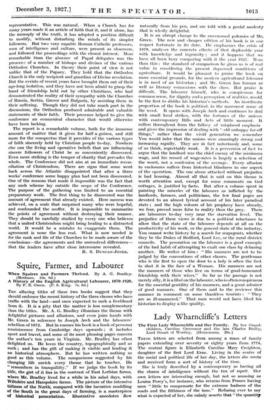A New Christendom
Faith and Order. Proceedings ,of the World Conference, Lausanne, 1927. (Student Christian Movement. 10s. 6d.) Tan World Conference held at Lausanne last August was— to those who look below the surface of things—an event of historic importance. It marked a change of outlook of the most far-reaching character in all the Christian Churches. In spite of sporadic and evanescent movements towards unity, it is broadly true that from the peace of Westphalia till the European War the various bodies into which Christendom was divided had come to regard this division as inevitable and permanent.. During the nineteenth century there were many who rejoiced in it ; schism came to be regarded as part of the Providence of God, designed to show the richness of His grace. But during that same century—and especially towards its close—an undertone of dissatisfaction began to .make itself heard. This dissatisfaction was chiefly to be observed in English-speaking countries. In England the revolutionary conception—for it was nothing less—of the historic Church as the living instrument of the One Christ, thrown upon the world as a new idea by the Tractarians, has worked like a ferment, and penetrated into religious thought far beyond the limits of Anglicanism. In the United States the impetus to change was enhanced by a special combination of circum- stances. Nowhere else is there to be seen so varied a selection of bodies claiming the title Christian ; and in no other country do these bodies possess such large resources in wealth and numbers. Nowhere is the problem of welding a vast congeries of races and traditions into one national culture more urgent, and nowhere are thoughtful people more deeply persuaded that a common bond of religion must play a large part in unification. Lausanne, then, is important, because it registers to all the world a widespread and increasing change of view. Christianity has always claimed an ecumenical mission. There is now running through all Churches a deep current of feeling—initiated by English-speaking Christianity—that, if that mission is to be fulfilled, the Christian Society must be, in some real and intelligible sense, one.
The origin of the World Conference is illuminating. It is to be found in a gathering of representatives of different _ — , Christian bodies mostly Anglo-Saxon, which met at Edinburgh
in 1910 to consider- the missionnry. situation. But it was
. .
across the seas that the- idea was taken up as a challenge to action. The virtue of American civilization consists in its hopefulness. Over prone to despise the past, the citizens of the United States exhibit magnificently an incapacity to be daunted by the mere assertion of novelty. And so it was from America, and from that Church in America that had most felt the influence of the Traetarian revival, there sprang the impulse to take practical steps to bring representatives of all Churches face to face in one great Christian Council. In 1910, almost immediately after the Edinburgh Conference, the Protestant Episcopal Church in the United States, which is the Church in communion with Canterbury and York, started a movement that gathered momentum as it progressed. The most elaborate preparations were made. Every Church was asked to participate. As time went on, more and more
of them signified a wish to take part until, when the Con•
ference—which had naturally been delayed by the War— actually met at Lausanne last August, every Christian body Of any significance, one, sent delegates. The exception was important. The Roman Catholic Church bad no official
representative. This was natural.. When a Church has for many years made it an article of faith thatit, and it alone, has
the monoply of the truth, it has adopted a position difficult to modify, without disturbing the minds of its simpler followers. But two very capable Roman Catholic professors, men of intelligence and culture, were present as observers, and followed the proceedings with the closest interest. More remarkable than the absence of Papal delegates was the presence of a number of bishops and divines of the various Orthodox Churches. In theory their point of view is not unlike that of the Papacy. They hold that the Orthodox Church is the only recipient and guardian of Divine revelation. But the events of recent years have brought them out of their age-long isolation, and they have not been afraid to grasp the hand of friendship held out by other Christians, who had demonstrated the reality of their sympathy with the Churches of Russia, Serbia, Greece and Bulgaria, by assisting them in their suffering. Though they did not take much part in the discussions, the Orthodox produced admirable and valuable statements of their faith. Their presence helped to give the conference an ecumenical character that would otherwise have been lacking.
The report is a remarkable volume, both for the inunense amount of matter that it gives for half a guinea, and still more for the conspectus that it provides of the various types of faith sincerely held by Christian people to-day. Nowhere else can the living and operative beliefs that are influencing sincere followers of Christ be so conveniently discovered. Even more striking is the temper of charity that pervades the whole. The Conference did not aim at an immediate recon- ciliation of Christendom. There are signs that some went back across the Atlantic disappointed that after a three weeks' conference some happy plan had not been discovered. One of the reasons that made it impossible was the fact that any such scheme lay outside the scope of the Conference. The purpose of the gathering was limited to an essential preparatory work. The first thing to be discovered was the amount of agreement that already existed. Here success was achieved, on a scale that surprised many who were hopeful, and confounded the scoffer. It is impossible to summarize the points of agreement without destroying their nuance. They should be carefully studied by every one who believes that a united Christendom might bring healing to a distracted world. It would be a mistake to exaggerate them. The agreement is none the less real. What is now needed is for the rank and file of the Churches to be made aware of the conclusions—the agreements and the unresolved differences— that the leaders have after close intercourse revealed.
R. S. DUNCAN-JONES.











































































 Previous page
Previous page